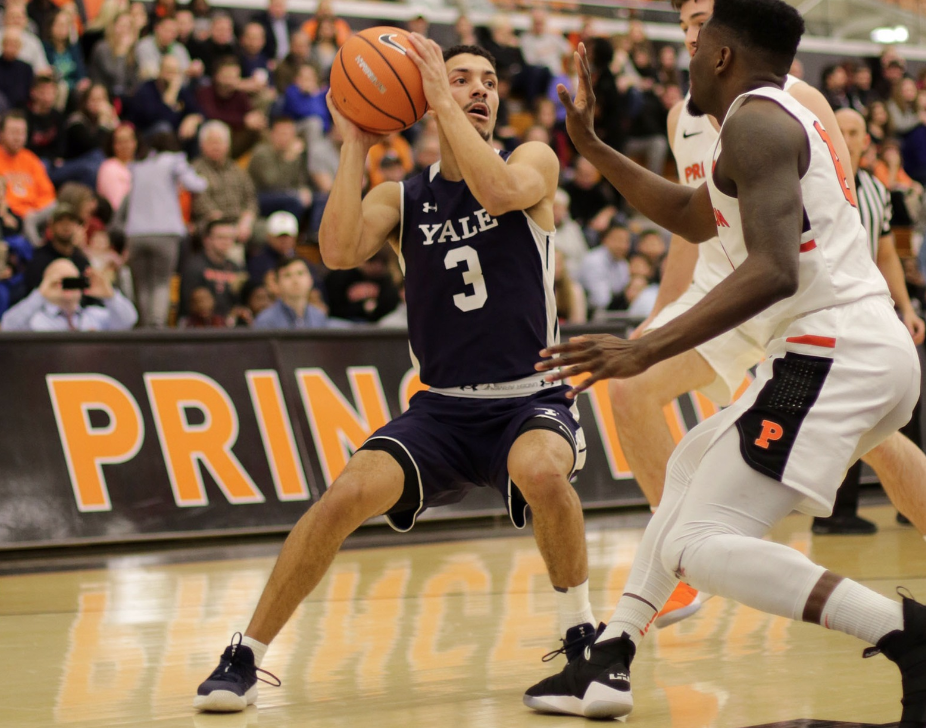
Yale Athletics
The Yale men’s basketball team left opposing head coaches bewildered on back-to-back nights.
The Bulldogs (9–13, 2–4 Ivy) suffered two tough losses on the road to Princeton (11–9, 3–2) and Penn (15–6, 5–0), and the coaches of both winning teams struggled to explain the outcome. This hazy but unmistakable barrier between Yale and its top Ivy League peers — a separation between teams that can win and teams that do win — made the 0–2 weekend all the more frustrating for the Elis, who fell to a tie for sixth place in the conference.
“I did not think we played well at all,” Princeton head coach Mitch Henderson said after his team’s 76–73 overtime victory. “We’re fortunate, and we’ll take it — you have to get those in this league.”
The following night, Penn coach Steve Donahue had no better articulation of the key factor that helped his team grind out a 59–50 victory over the Bulldogs: “We’re a team that figures out a way to win the game, that’s the only way I can say it.”
In both losses, Yale received stellar contributions from starters other than its top scorer Miye Oni ’20, who managed just six points in each game. But the Bulldogs struggled to execute when it mattered most — particularly from the perimeter — while Princeton and Penn each received momentum-shifting sparks from bench players, putting the dagger in the Elis’ hopes for a statement victory.
“We’re very close to being good,” head coach James Jones said in Philadelphia. “That’s the thing that you take out of [a weekend like this]. We have an opportunity to be successful down the road here. We just have to clean up a few things and play a little smarter. If we’re a little smarter last night, we beat Princeton. We’re 1–19 from the arc tonight. You’re just not going to win too many games [playing like that], especially against a good team.”
Friday night’s loss to Princeton was a particular gut-punch. Playing with a small lineup, the Elis held the Tigers scoreless for the final 3:50 of the first half and then went on a 10–2 run after the break, building a 10-point lead with just under 15 minutes remaining. Yale’s defense forced five turnovers in that five-minute stretch.
But Princeton’s Myles Stephens and Amir Bell chipped away at the deficit, ensuring that the game would be decided in the final few possessions. With the game knotted at 66 in regulation, Yale struggled to create a look at the basket, and guard Trey Phills ’19 missed a contested 3-pointer as time expired. Jones said that he wished Phills had penetrated instead of pulling up for a jumper.
Oni had fouled out with just over a minute remaining, depriving the Elis of crucial size on the defensive end in the game’s final possessions.
Jerome Desrosiers, a Tigers’ role player, was left open at the 3-point line with 36 seconds to play in extra time, and he made the visitors pay. On the Elis’ ensuing possession, first-year guard Azar Swain ’21 corralled the offensive rebound off a 3-point miss from forward Blake Reynolds ’19 and passed up a wide open layup with 15 seconds on the clock. Instead, he dribbled back out and misfired on an attempt from behind the arc.
After missing Yale’s previous game with a strained hamstring, Reynolds returned and played 28 effective minutes, shooting 7–12. Copeland and Phills were ironmen for the Bulldogs, playing 40 and 37 minutes, respectively, and combining for 35 points. Phills posted a game-high 14 rebounds.
On Saturday night, rookie forward Paul Atkinson ’21 assumed the mantle from the junior guards and delivered a career performance. After Reynolds was whistled for two early fouls, Atkinson anchored the interior with 20 points and 13 rebounds. Penn, however, still enjoyed advantages in both rebounding and points in the paint over the Bulldogs.
The undefeated Quakers have established their identity as a defensively dominant team, but both teams began Saturday’s affair at the Palestra on a tear. By the first media timeout, the teams had combined for 17 points.
Oni succeeded in finding the basket on Yale’s first two possessions, but Penn’s league-leading defense began to strengthen its grip on the Elis. Against a suffocating defense and raucous crowd, the Elis scored just 25 points in the first half and shot a measly 36 percent from the field while going 0–7 from deep.
“We weren’t patient offensively,” Jones said. “We didn’t run our motion well. They were switching up their ball-screen coverage, and we got impatient when they did and took some ill-advised shots that didn’t go in.”
After the quick start, the Bulldogs began to settle for long jumpers, which played into Penn’s hand. The Quakers’ perimeter defense caused all kinds of issues for Eli players, who repeatedly found themselves trapped in isolation situations with the shot-clock winding down.
The Elis were just three points away from overtaking the Quakers in the second half when Phills gathered a loose offensive rebound and scored a putback. But Penn responded quickly, and reserve guard Jake Silpe hit back-to-back 3-pointers to put the Bulldogs at bay. Much of the second half progressed in this fashion, as Yale surged at the Quakers but could not bend the will of a resilient team.
“Good teams do that,” Jones said. “You’re going to make a run, and good teams are going to come back at you. … We have to be better defensively, and you don’t really expect a guy [like Silpe] to come off the bench and take shots that are big and knock them down. We had some opportunities to do the same, and we didn’t.”
With the loss, Yale endured its first winless two-game conference weekend since its last Princeton-Penn weekend one year ago.
Won Jung | won.jung@yale.edu
Steven Rome | steven.rome@yale.edu







